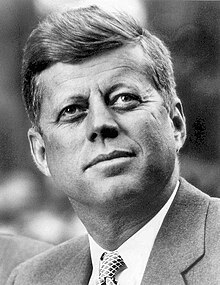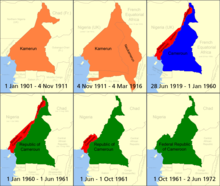
John F. Kennedy
Born on May 29, 1917, John F. Kennedy was the 35th president of the United States from 1961–63. His assassination on November 22, 1963, as he was riding in a motorcade in Dallas, made him the youngest US president to die in office. His presidency was marked by the highest tension America ever had with the states of the communist world. These included the Cuban Missile Crisis, the Bay of Pigs Invasion, the construction of the Berlin wall and his Berlin speech, and a multifold increase in American military involvement in Vietnam. Even so, he managed to secure memorable achievements such as the Nuclear Test-Ban Treaty, the Alliance for Progress, the establishment of the American Peace Corps, developments in the Space Race, the Trade Expansion Act to lower tariffs, and desegregation, which he accomplished working with the Civil Rights Movement under the leadership of Martin Luther King Jr.
John F. Kennedy made history in the USA by becoming the youngest man and the first Roman Catholic that the country ever elected to the presidency of the United States. He began his memorable presidency with his equally memorable inaugural address, where he called upon Americans “to bear the burden of a long twilight struggle…against the common enemies of man: tyranny, poverty, disease, and war itself.”
However, when he declared that:
“In the long history of the world, only a few generations have been granted the role of defending freedom in its hour of maximum danger. I do not shrink from this responsibility—I welcome it…The energy, the faith, the devotion which we bring to this endeavor will light our country and all who serve it—and the glow from that fire can truly light the world. And so, my fellow Americans: ask not what your country can do for you—ask what you can do for your country.”
It was a highlight that his presidency would be different from those of his predecessors.
However, his expected two-tern presidency was cut short not up to three years into his stay in the Oval Office by the bullets of his assassin(s). Lee Harvey Oswald, a self-described communist, was accused of killing President John F. Kennedy in Dallas, Texas with three shots at 12:30 pm on November 22, 1963, from a window on the sixth floor of a depository building, using a mail-order rifle, and was formally arraigned for the “Murder of President Kennedy” an hour later.
Jack Ruby, a distraught Dallas nightclub owner, shot Oswald dead on the morning of November 24, while he was being transferred from a jail cell to an interrogation office. The United States judiciary system tried and found him guilty of murder on March 14, 1964, and as punishment sentenced him to death. A Texas appeals court reversed the conviction in October 1966, but Ruby died, apparently from a blood clot complicated by cancer on January 3, 1967, before a new trial could be held.
Kennedy’s Vice President Lyndon B. Johnson succeeded him. The official conclusion by the FBI and the Warren Commission that Oswald was the lone assassin, was sharply criticized. The United States House Select Committee on Assassinations (HSCA) agreed that Oswald fired the shots that killed the President John F. Kennedy, but the committee also concluded that Kennedy was likely assassinated as the result of a conspiracy. Most Americans who are cognizant of the John F. Kennedy assassination believe Oswald was not the only shooter, and that there was a conspiracy.
Kennedy’s engagement with the Soviet Union following the Cuban Missile Crisis led to an effective management of the Cold War, and set the grounds for other US presidents to pursue policies that culminated with the ending on the cold war between the USA and the USSR (Union of Soviet Socialist Republics, otherwise called the Soviet Union or Soviet Russia) in the late 1980s.
Many Americans compare the shocking and memorable nature of the announcement of John F. Kennedy’s assassination with the tidings of the Japanese attack on Pearl Harbor on December 7, 1941, before it and the memorable September 11, 2001 terrorist attacks on the Twin Towers and the Pentagon after it. An estimated 16 million people visited his grave over a period of three years from 1964-1966.
There are several songs out there such as Dion Francis DiMucci’s "Abraham, Martin and John," written by Dick Holler that honor the 35th president. Memorials, busts and statues; Plazas and squares; Airports and space center; Roads and bridges; Buildings; School etcetera are out there in the USA and other parts of the world in honor of John F. Kennedy. In fact, the U.S. Navy aircraft carrier USS John F. Kennedy (CV-67) was named after him and served until March 23, 2007. A second USS John F. Kennedy (CVN-79) aircraft carrier that is due to be commissioned in 2018 attests to the mark he left in the annals of US. history. These add to the John F. Kennedy International Airport, in New York City, which is America’s busiest international gateway; the John F. Kennedy Space Center that manages and operates America's astronaut launch facilities in Merritt Island, Florida; as well as a Kennedy fifty-cent coin that was first minted in 1964.
The Union Moujik
by Janvier Chando,
The Girl on the Trail
by Janvier Chouteu-Chando











